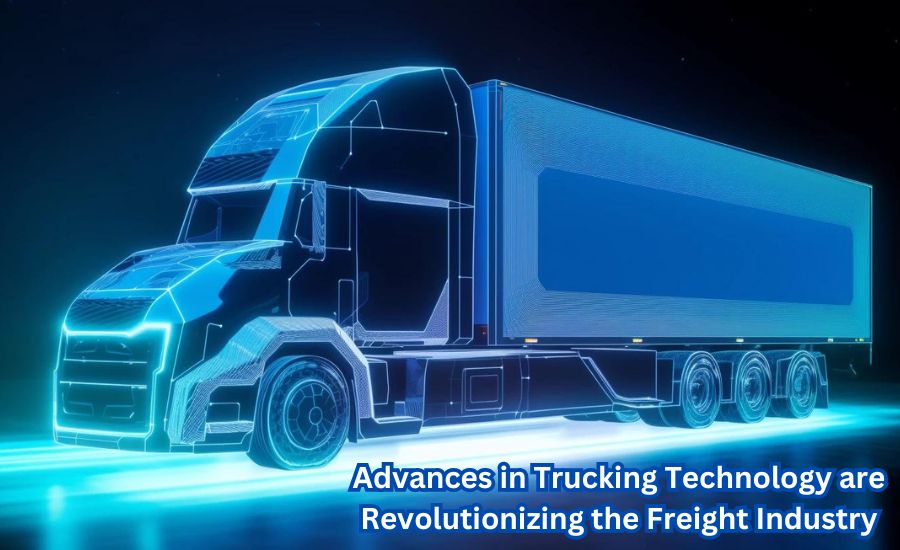In recent years, the freight industry has seen remarkable advancements in trucking technology. These innovations enhance operational efficiency and pave the way for a more sustainable and safer transportation system. From intelligent telematics to autonomous vehicles, the landscape of freight logistics is rapidly evolving.
Companies in major transport hubs, including Dallas trucking companies, are adopting these cutting-edge technologies to stay competitive and efficient. The push towards these technologies is driven by the need to reduce operational costs, bolster safety, and meet stricter environmental regulations.
Key Takeaways
- Innovations in trucking technology are improving efficiency, safety, and environmental sustainability.
- Autonomous vehicles and telematics systems are transforming how goods are transported across the country.
- Emerging tech trends such as platooning, electric trucks, and blockchain offer promising futures for the freight industry.
The Role of Autonomous Vehicles
Perhaps the most talked-about innovation is autonomous vehicles. Self-driving trucks promise a future where human drivers may no longer need to be behind the wheel for long-haul routes. Businesses are leading the way in adopting this game-changing technology to decrease mistakes, cut operational expenses, and improve road safety. Additionally, these vehicles can operate without rest breaks, making continuous long-distance travel possible and significantly improving delivery times. Improved safety is another critical advantage, as autonomous trucks aim to reduce the number of human error-related accidents, which currently account for a significant portion of traffic incidents.
Telematics and Fleet Management
The integration of telematics into fleet management has been another significant development. Advanced telematics systems provide real-time data on vehicle location, driver behavior, and engine diagnostics. This information allows freight companies to optimize routes, enhance driver safety, and reduce fuel consumption.
The insights from telematics data can also lead to predictive maintenance, minimizing vehicle downtime and saving repair costs. As indicated in a study mentioned by FreightWaves, telematics could increase fuel efficiency by up to 15%, proving to be an essential tool for the industry.
Telematics technology saves on fuel and improves fleet management by closely monitoring and correcting unsafe driving habits, reducing insurance expenses, and ensuring safety compliance.
Platooning: Driving in Sync
Trucking platooning involves multiple trucks driving in close convoy, linked electronically, and driven in unison by a lead vehicle. This approach reduces fuel consumption, increases road capacity, and enhances safety.
The trucks in a platoon communicate through wireless systems, allowing them to keep a close, constant distance, reducing aerodynamic drag and saving fuel costs. Wireless communication systems ensure that all vehicles in the platoon can react instantly to the movements of the lead vehicle, minimizing the risk of accidents.
This method also optimizes road usage by reducing the space required between trucks, increasing traffic flow and efficiency. Regulatory bodies are closely examining the implications of platooning, aiming to facilitate its safe and widespread adoption while ensuring compliance with road safety standards and minimizing potential risks.
The Rise of Electric Trucks
Electric trucks are a significant change towards promoting environmental sustainability in the transportation of goods. Enterprises are taking the forefront in developing electric trucks to decrease carbon emissions and reduce reliance on fossil fuels.
These trucks offer quieter operation and lower maintenance costs, potentially revolutionizing urban freight delivery and long-haul transportation. Adopting electric trucks is expected to significantly lower greenhouse gas emissions, addressing the increasing governmental and societal pressures to combat climate change.
Moreover, electric trucks may benefit from incentives such as tax credits and subsidies, further pushing their viability in the market. However, adopting electric trucks comes with challenges, including extensive charging infrastructure and advancements in battery technology to support long-distance travel.
Blockchain in Freight Management
Blockchain technology has enormous potential in freight management by providing transparent and secure transaction records. By utilizing decentralized ledgers, freight companies can improve traceability, reduce fraud, and streamline administrative processes.
Companies can gain enhanced insight into their supply chains by using blockchain technology, leading to more efficient and dependable transportation of goods. Blockchain can create more reliable and efficient supply chains, making it a promising innovation for the future of logistics.
The tamper-resistant nature of blockchain ensures that records are immutable, improving trust among stakeholders and reducing the chances of disputes. Additionally, smart contracts can automate and enforce contractual terms, reducing administrative overhead and potential errors in freight management processes.
Challenges and Future Prospects
Despite the numerous advancements, the trucking industry faces challenges. Integrating new technologies requires significant investment and cultural shifts within companies. Small to medium-sized enterprises may find allocating resources towards these advancements particularly challenging.
Furthermore, cybersecurity, regulatory compliance, and workforce training must be addressed to ensure smooth technological transitions. Cybersecurity remains a concern, as the increased digitization of truck fleets opens new avenues for cyber-attacks. Regulatory landscapes must also evolve to keep pace with technological advancements, ensuring that safety and operational standards are maintained.
Workforce training is vital, as the current and future workforce must be proficient in managing and working alongside these new technologies. Nevertheless, the future of trucking looks bright as technology continues to drive the industry towards greater efficiency and sustainability.
As public and private investments in technology grow, adopting these innovations is expected to accelerate, paving the way for safer, more efficient, and environmentally friendly freight transportation.
Stay informed with the latest news and updates on Discover Essential.com
